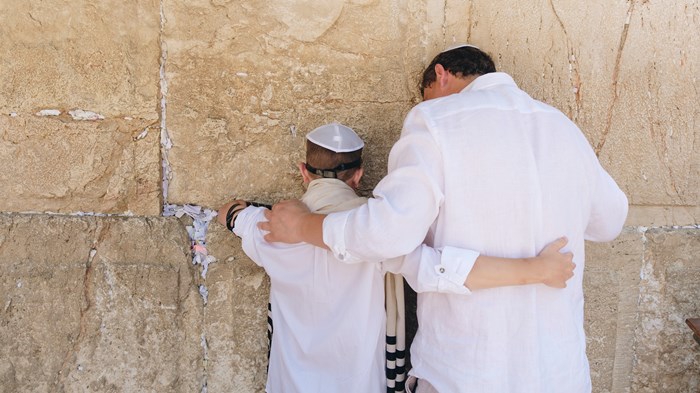The Innovative Ways That Israeli Rabbis Adapted to COVID-19 Lockdown Restrictions

From weekly Shabbat services to high holy days, life for most Israeli Jewish communities revolves around regular in-person gatherings. When the Israeli government announced a strict lockdown on March 9, 2020, these came to a screeching halt. The government banned gatherings of more than two people except for funerals and circumcision ceremonies. As a result, all synagogues were forced to close and religious prayers which were once public were forced to adapt to the new normal of the COVID-19 lockdown.
This did not just cause mass upheaval in the religious life of many Israeli Jews but also in their psychological well being, as religious gathering meets the "belonging need" outlined Maslow’s hierarchy of needs, which follows immediately after "physiological and security needs" in terms of importance.
This need requires stable interpersonal relationships with frequent interactions, which the thrice daily minyan prayer gatherings provide many Jews (at least 10 men or women typically gather for these). These prayer gatherings facilitate a sense of belonging and purpose and is at the core of community life for many Israeli Jews.
Professor Rivi Frei-Landau of the Culturally-Sensitive Clinical Psychology Program at the Open University of Israel wrote for a psychology journal about how Rabbanim (Jewish community leaders) adapted their religious rituals during COVID:
“Enabling alternative ways to continue performing religious rituals was imperative—first of all, because it helps community members maintain a sense of belonging. Second, because religion is a framework that provides meaning and significance, especially in times of stress, it is considered a coping resource that promotes human resilience. Finally, in light of the association found between religious fundamentalism (and thus, by extension, observance too) and a preference for religious—rather than psychological—help-seeking, maintaining religious practices and customs in times of stress becomes even more crucial.
Similarly, Freud claimed that maintaining religious rituals can help relieve the individual’s anxiety—a desirable consequence in times of stress.”
Balcony prayers deemed okay.
Inspired by the pandemic balcony singing and cheering in Italy, the Rabbanim decided that the thrice-daily Minyan prayer meetings would be allowed to be conducted amongst neighbors on balconies as long as the neighbors made eye contact with each other.
“Accordingly, neighbors established relationships quite quickly (in some cases, WhatsApp groups were set up to coordinate prayer schedules). Eventually, this new form of religious practice resulted in social support, mutual assistance, and general discourse regarding the pandemic.”
Independent religious learning groups (Chivruta) went virtual using video conferencing.
“To preserve ways for social collaborative learning, as well as to enable the leaders to continue preaching to believers, the chief rabbinate decided that during the pandemic, these social interactions would be conducted using a video-conferencing application (Zoom), a step reminiscent of educational institutions’ sudden shift to using information and communications technology (ICT). This continuous, virtual, and collective relationship enabled the community members to maintain social ties and a sense of belonging.”
Passover celebrations were broadcasted virtually.
Passover is an important family gathering for many Jews and allowing it to be conducted virtually was quite controversial.
“The Jewish religious precepts forbid the use of electronic devices during religious holidays; hence, this was an innovative rule that aroused a huge debate among the various Jewish religious denominations. Notwithstanding, this ruling demonstrates religious figures’ acknowledgment that a sense of belonging is vital for maintaining one’s resilience in difficult times.”
Frei-Landau’s research on the adaptation of Jewish religious rituals sheds light on a few of the many ways that religious communities have had to adapt their practice to meet the social-distancing requirements imposed during the COVID-19 pandemic. Hopefully, her research will prompt further research in other religious communities as to how to best adapt and utilize existing communal and religious structures to serve communities around the world spiritually and promote mental health in the face of disasters.
Daniel Kohl is a current master’s student in the Humanitarian and Disaster Leadership program at Wheaton College (IL). He grew up in the Middle East and prior to his master’s degree, he received a bachelor’s degree in Economics & Business from Westmont College.
References:
Frei-Landau, R. (2020). “When the going gets tough, the tough get—Creative”: Israeli Jewish religious leaders find religiously innovative ways to preserve community members’ sense of belonging and resilience during the COVID-19 pandemic. Psychological Trauma: Theory, Research, Practice, and Policy, 12(S1), S258-S260. http://dx.doi.org/10.1037/tra0000822
The Better Samaritan is a part of CT's
Blog Forum. Support the work of CT.
Subscribe and get one year free.
The views of the blogger do not necessarily reflect those of Christianity Today.






















